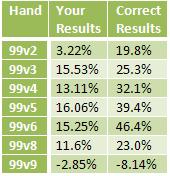Can't resist
I was going to let this one go since Qfit already responded to it, but there are just too many issues to ignore.
bjsim said:
Showing an edge of 4-10% for Splitting 9 on 8.
That’s a HUGE range! An answer that vague is not helpful at all. The advantage for standing on 9,9 vs. 8 (2D S17 DAS) is about 8.56%. So is splitting really better than standing if we only know that it is somewhere between 4% and 10%? It is impossible to make the right decision with that information.
The results on your website show an advantage of 11.6% so I’m not sure where the 4-10% came from. Maybe that was the result of the individual sims before you averaged them together?
As numerous people have said before, 1M rounds is not nearly enough to get accurate numbers. According to your website you only played 2,726 hands of 9,9 vs. 8 to get your EV estimate. Play another 2k hands and see how different the results are. Then try it again. Do you understand why those results are completely unreliable?
The numbers you give are not correct. If we look at the
true EV (Archive copy) of that play we can see that it is around 22.1%, not 4-10% (or 11.6%).
So there are obviously problems with your program
and your methodology. You really need to address these issues if you want to make your software practical.
-Sonny-

